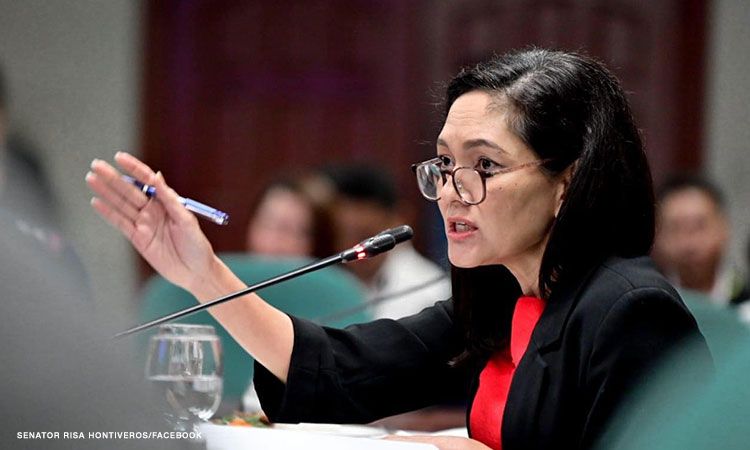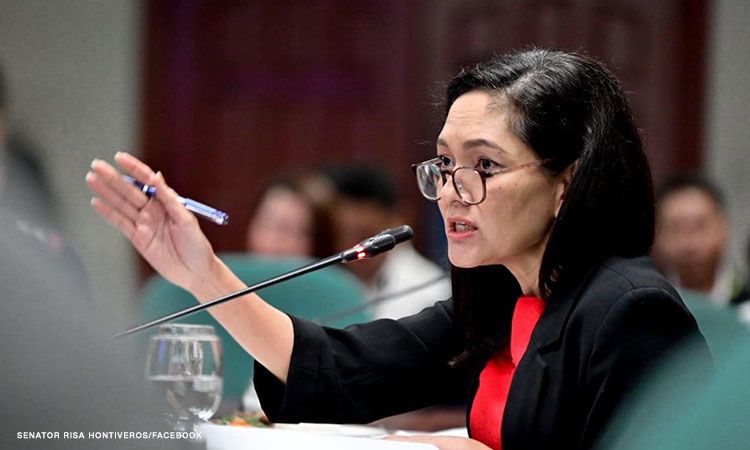
THE Senate plenary has opened deliberations into what has been described as an overdue measure amid reports of rampant child sex abuse in the pandemic lockdowns: a bill increasing the age for determining the crime of statutory rape and other acts of sexual abuse from 12 to 16 years of age.
Senator Richard J. Gordon, Chairman of the Committee on Justice and Human Rights, sponsored on Wednesday Senate Bill No. 2332 for this purpose. Also pushing the measure strongly is Sen. Risa Hontiveros, a child rights advocate who chairs the Senate Committee on Women and is the principal author of the bill.
Majority Leader Juan Miguel Zubiri also enlisted as a prime supporter of the bill, which had long been sought in past Congresses for over a decade.
“We advocate to increase the age of sexual consent, through multisectoral partnerships with the judiciary, social welfare, education and health sectors as thousands of children are robbed of their youth — the physical and emotional effect creates lasting emotional and psychological scars, that the damage can last for a lifetime,” Gordon said in his sponsorship speech.
Gordon pointed out that the Philippines has the lowest age of sexual consent in Asia and one of the lowest in the world.
Child sexual abuse, he said, can affect the victim’s psychological and physical well-being, family and intimate relationships, faith, and education, and career.
“It is for these reasons that Congress has a role in preventing and responding to child sexual abuse in the country. We must uphold the right of the child to freedom from sexual abuse,” Gordon stressed.
The close-in-age exemption or the “sweetheart clause” is included in SBN 2332, which is the exemption — from being considered as statutory rape — of consensual, non-abusive, and non-exploitative sexual activity between partners whose difference of age is only four years or less.
Lawmakers explained this will protect young people engaged in consensual sexual activity while strongly punishing adult predators, especially those whose blood relations or relationships of trust with minor victims mark the severity of their offense.
“This seeks to balance the best interests of the child considering their evolving capacities, physical and mental maturity, vis-a-vis their protection against rape, sexual abuse, and exploitation,” Gordon explained of the “sweetheart clause.”
Hontiveros said, “this groundbreaking legislation to raise the age of sexual consent” is urgent, given the cases cited by advocates of children aged 13 or 14 “who are asked to prove in court that they did not consent to the sexual act, with some even being asked if they enjoyed it. As a result, many victims opt to stay silent. As a mother, I am disgusted that the current state of our laws subjects a 13-year-old to this kind of cruelty. As a policymaker, I am pleased that we now take an advantage of a historical opportunity to correct this.”
Gender-neutral
Another significant provision of SBN 2332 is that men and women may be charged with statutory rape. The proposed law, as Gordon explained, will address this issue by giving equal protection to boys.
“The sexual orientation of the offender is of no importance as we find that perpetrators of sexual abuse against boys are given much lesser sentences than those found guilty of raping girls. The proposed law will address this issue by giving gender-neutral protection to children,” said Gordon.
The National Baseline Study on Violence Against Children (NBS-VAC), a 2015 study by the government supported by the United Nations International Children’s Emergency Fund (UNICEF) Philippines of 3,866 children and young people (13 to 24 years old), revealed that one-in-four children (24.9 percent) reportedly suffered from any form of sexual violence in any setting.
According to the data from the Department of Social Welfare and Development (DSWD), from 2015 to 2017, most of the victims of rape and child incest were between the ages of 14 to below 18, way above the minimum age set by RA 8353 (The Anti-Rape Law of 1997) of under 12 years old.
The National Bureau of Investigation also revealed in a report in 2020 that about 17.1 percent of children aged 13-18 years experienced any form of sexual violence while growing up. A prevalence of 1.6 percent was noted in the past 12 months.
“It is the policy of the State to value the dignity of every human person and guarantee full respect for human rights. It is likewise the policy of the state to recognize the vital role of the youth in nation-building and shall promote and protect their physical, moral, spiritual, intellectual, and social well-being,” said Gordon.
Senate Majority Leader Zubiri co-sponsored on Wednesday Senate Bill No. 2332, which amends the Revised Penal Code to raise the age of sexual consent from the current 12 years old to 16 years old. The bill also amends the language of the law to reflect that rape is committed “by a person against any person,” instead of the previous “by a man who shall have carnal knowledge of a woman.”
In his co-sponsorship speech, Zubiri brought up the 2019 story of a male Grade 7 student at a Laguna high school who was shot dead by a security guard against whom the victim had filed sexual abuse complaints. The incident was the catalyst for Zubiri to file Senate Bill No. 305, now contained in the Committee Report along with similar bills filed by Senators Hontiveros, Gordon, Leila De Lima, Win Gatchalian, Nancy Binay, Imee Marcos, and Bong Revilla.
“Learning of these cases will really make one’s blood boil. As a parent, I cannot imagine what I will do to the perpetrator if that happens to my child,” Zubiri said.
“The Philippines has the lowest age of consent for sexual acts among the countries in Asia, and one of the lowest in the world at 12 years old, only bested by Niger at age 11,” Zubiri stressed.
Zubiri also cited World Bank data showing that the Philippines has 47 births annually per 1,000 young women aged 15 to 19, higher than the average adolescent birth rates of 44 per 1,000 young women globally, and 33 in the Asean region.
“As legislators, we need to ensure that our youth are protected and that we set measures that will mitigate, if not totally eradicate, these alarming statistics on sexual violence against children.”

